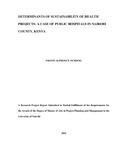| dc.description.abstract | In Kenya, National and County Governments, local and international NGOs and other concerned organizations invest large sums every year for the implementation of health projects. Failure of these projects has been attributed to lack of stakeholder involvement, clarity of mission and goals of the project, the capacity of the project managers and funds availability among others. Sustainability of such projects has therefore not been achieved despite major efforts from various development partners. This study sought to establish the determinants of sustainability of health projects in public hospitals in Nairobi County. The study adopted descriptive research design. The target population for this study was 8 health projects in Public Hospitals within Nairobi County, from where 168 respondents involved in implementation of health projects were selected. Stratified random sampling was used to select a sample size of 84 respondents. Questionnaire was used to collect data. Quantitative data collected was analyzed by the use of descriptive statistics using SPSS (Vversion 22) and presented through percentages, means, standard deviations frequencies and in prose-form. Multiple regression analysis was used to establish the relations between the independent and dependent variables. The study found that stakeholders play a role and interact at multiple levels and their role and interaction determine the effectiveness of project sustainability and that satisfying key stakeholder requirement is central to achieving a successful project outcome. Project mission and goals influence sustainability of health projects. Project Manager‟s understanding of important issues for each stakeholder group is an important success factor; the extent to which the project manager is able to organize the people, ideas and resources to achieve the objectives of the project determines the sustainability of the project. Availability of funds on sustainability of health projects, sources and composition of project finance is key factor that influence the project sustainability. Financial and economic analysis is crucial for any health project to be sustainable. In order to strengthen community participation in managing health projects, the researcher recommends that a lot of groundwork should be done during community entry. Communities should be made aware of their roles, responsibilities and expectations. Health project agencies should ensure that an effective user fee collection system is put in place for every health project facility that is constructed, if sustainability is to be achieved. Financial policies of projects should be well prepared and project mission and goals be made clear. | en_US |



